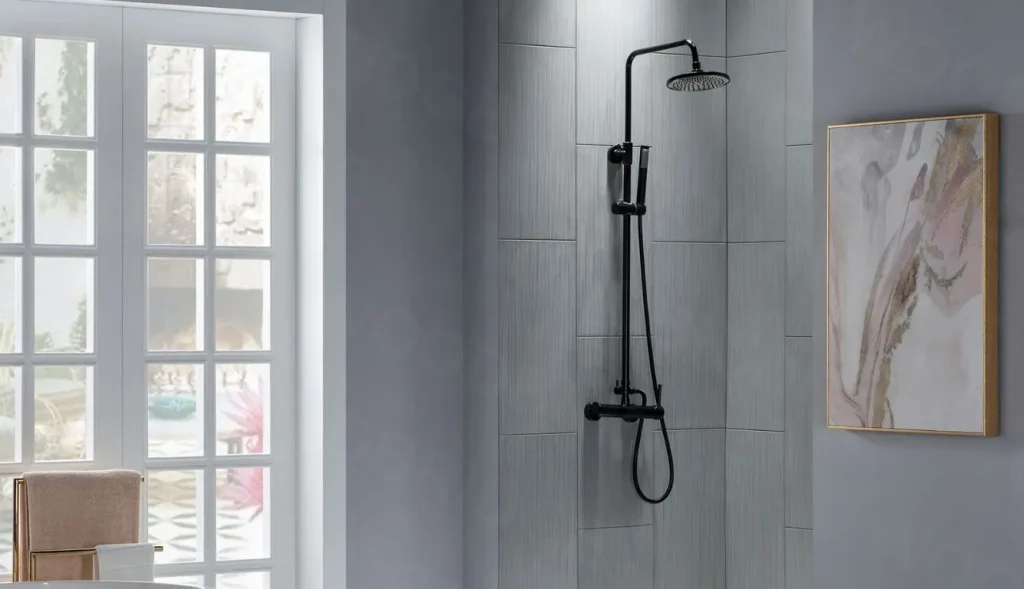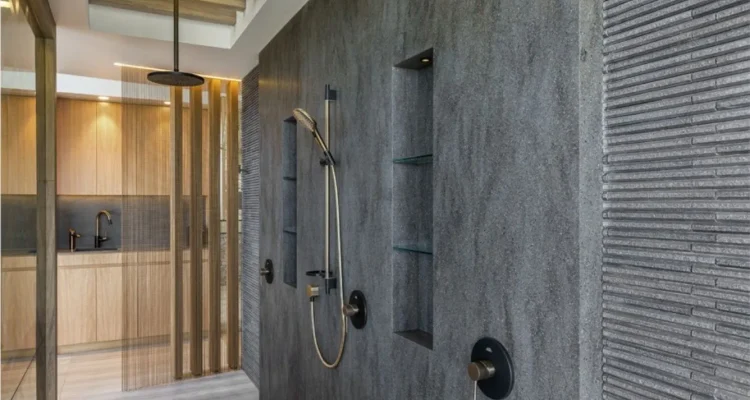Introduction
When it comes to designing or renovating your bathroom, one of the key decisions you’ll make is choosing the right material for your shower walls. With so many options available, it can be challenging to decide which one best suits your needs. Solid surfaces have become increasingly popular due to their durability, ease of maintenance, and sleek aesthetic appeal. But what exactly makes a solid surface ideal for shower walls, and which material should you choose?

Why Solid Surfaces are Ideal for Shower Walls
Durability and Longevity
Solid surfaces are known for their exceptional durability. Unlike tiles, which can crack or chip over time, solid surfaces are designed to withstand the rigors of daily use. They are resistant to moisture, which is crucial in a shower environment, and can last for decades with proper care.
Ease of Maintenance and Cleaning
One of the biggest advantages of solid surfaces is how easy they are to clean and maintain. With no grout lines to worry about, these surfaces don’t harbor mold or mildew, making them a hygienic option for bathrooms. A simple wipe down with a mild cleaner is often all that’s needed to keep them looking pristine.
Aesthetic Appeal
Solid surfaces offer a seamless look that can elevate the overall design of your bathroom. They are available in a wide range of colors, patterns, and finishes, allowing you to customize your shower walls to match your personal style.
Popular Solid Surface Materials for Shower Walls
Cultured Marble
What is Cultured Marble?
Cultured marble is a man-made material composed of crushed stone, resin, and pigments. It mimics the look of natural marble but at a fraction of the cost.
Pros and Cons of Cultured Marble
Pros:
- Affordable compared to natural stone
- Customizable in terms of color and pattern
- Seamless installation
Cons:
- Can be prone to scratches and stains
- Requires regular sealing to maintain its appearance
Solid Surface Acrylic
What is Solid Surface Acrylic?
Solid surface acrylic is a blend of acrylic polymers and natural minerals, creating a non-porous, durable surface that’s ideal for shower walls.
Pros and Cons of Solid Surface Acrylic
Pros:
- Non-porous, so it resists mold and mildew
- Easy to repair minor scratches
- Available in various colors and patterns
Cons:
- Can be more expensive than other options
- May require professional installation for the best results
Engineered Stone
What is Engineered Stone?
Engineered stone is a composite material made of crushed stone (typically quartz) bound together with resin. It offers the look of natural stone with enhanced durability.
Pros and Cons of Engineered Stone
Pros:
- Extremely durable and scratch-resistant
- Available in a wide range of natural-looking designs
- Low maintenance
Cons:
- Higher cost compared to other solid surfaces
- Heavier and more difficult to install
Corian and Other Composite Materials
What is Corian?
Corian is a brand name for a type of solid surface material made by DuPont. It’s composed of acrylic polymer and alumina trihydrate, offering a smooth, non-porous surface.
Pros and Cons of Corian
Pros:
- Seamless appearance with invisible joints
- Easy to clean and maintain
- Available in a variety of colors and finishes
Cons:
- Can be more expensive than other materials
- Not as heat-resistant as some other surfaces
Comparing Solid Surface Materials
Cost Comparison
When it comes to cost, solid surfaces vary widely. Cultured marble tends to be the most affordable, while engineered stone and Corian can be on the pricier side. It’s essential to weigh the initial investment against the long-term benefits, such as durability and ease of maintenance.
Installation Complexity
Some solid surfaces, like cultured marble, are relatively easy to install and can even be a DIY project for those with some experience. Others, like engineered stone and Corian, may require professional installation due to their weight and the need for precise fitting.
Visual and Design Flexibility
Solid surfaces offer a great deal of design flexibility. Whether you’re looking for a natural stone appearance or a sleek, modern finish, there’s a solid surface material that can meet your aesthetic needs. Additionally, because these materials are often custom-made, you can achieve a truly unique look.
How to Choose the Best Solid Surface for Your Shower Walls
Assessing Your Budget
Your budget is one of the most critical factors when choosing a solid surface for your shower walls. While it might be tempting to go for the most luxurious option, it’s important to find a balance between cost and quality. Consider how long you plan to stay in your home and whether a higher upfront cost might save you money in the long run due to lower maintenance needs.
Considering the Bathroom’s Style
The style of your bathroom should also influence your choice of material. For example, if you have a traditional bathroom, cultured marble with its classic look might be the best fit. On the other hand, a sleek, modern bathroom might benefit from the clean lines and contemporary appeal of Corian.
Evaluating Maintenance Needs
Different materials have different maintenance requirements. If you’re looking for a low-maintenance option, solid surface acrylic or Corian might be the way to go, as they are both non-porous and easy to clean. However, if you’re willing to put in a little more effort to maintain a luxurious look, engineered stone could be worth the extra work.
Understanding Longevity Expectations
Finally, consider how long you want your shower walls to last. While all solid surfaces are durable, some, like engineered stone, offer exceptional longevity and may outlast other options.
Installation Tips for Solid Surface Shower Walls
Professional vs. DIY Installation
If you’re handy and have some experience with home improvement projects, you might consider installing solid surface shower walls yourself. However, for more complex materials like engineered stone, hiring a professional can ensure a perfect finish and prevent costly mistakes.
Tools and Materials Needed
Depending on the material you choose, you may need specific tools, such as a saw for cutting solid surface acrylic or special adhesives for cultured marble. Make sure you have everything you need before starting the installation process.
Common Mistakes to Avoid
One common mistake is not properly preparing the shower walls before installation. Ensure that the surface is clean, dry, and free of any debris. Additionally, avoid rushing the installation—take your time to ensure that each panel is aligned correctly and securely attached.
Caring for Solid Surface Shower Walls
Daily Cleaning Tips
To keep your solid surface shower walls looking their best, clean them regularly with a mild, non-abrasive cleaner. Avoid harsh chemicals that could damage the surface, and rinse thoroughly after cleaning.
Avoiding Common Damages
While solid surfaces are durable, they can still be damaged by excessive force or sharp objects. Be careful when placing heavy items in the shower, and avoid using abrasive sponges or scrubbers that could scratch the surface.
Repairing Minor Scratches and Chips
One of the benefits of solid surfaces is that minor scratches and chips can often be repaired. For acrylic surfaces, a fine-grit sandpaper can be used to buff out small scratches, while deeper chips may require a professional repair kit.
FAQs
What is the most cost-effective solid surface for shower walls?
Cultured marble is typically the most cost-effective option, offering a great balance between affordability and aesthetic appeal.
Can solid surfaces be installed over existing tiles?
Yes, in many cases, solid surfaces can be installed directly over existing tiles, but it’s essential to ensure that the underlying structure is sound.
How do solid surfaces compare to traditional tiles?
Solid surfaces offer a seamless look with fewer maintenance needs compared to traditional tiles, which can have issues with grout lines and mold.
What are the common mistakes to avoid when installing solid surfaces?
Some common mistakes include improper surface preparation and rushing the installation process, leading to misalignment or poor adhesion.
How long do solid surface shower walls typically last?
With proper care, solid surface shower walls can last for decades, often outlasting other materials like traditional tiles.
Conclusion
Choosing the best solid surface for your shower walls involves considering your budget, the style of your bathroom, and your maintenance preferences. Whether you opt for the affordability of cultured marble, the durability of engineered stone, or the sleek look of Corian, solid surfaces offer a combination of beauty and functionality that’s hard to beat. By understanding the pros and cons of each material, you can make an informed decision that will enhance your bathroom for years to come.


Congratulation!